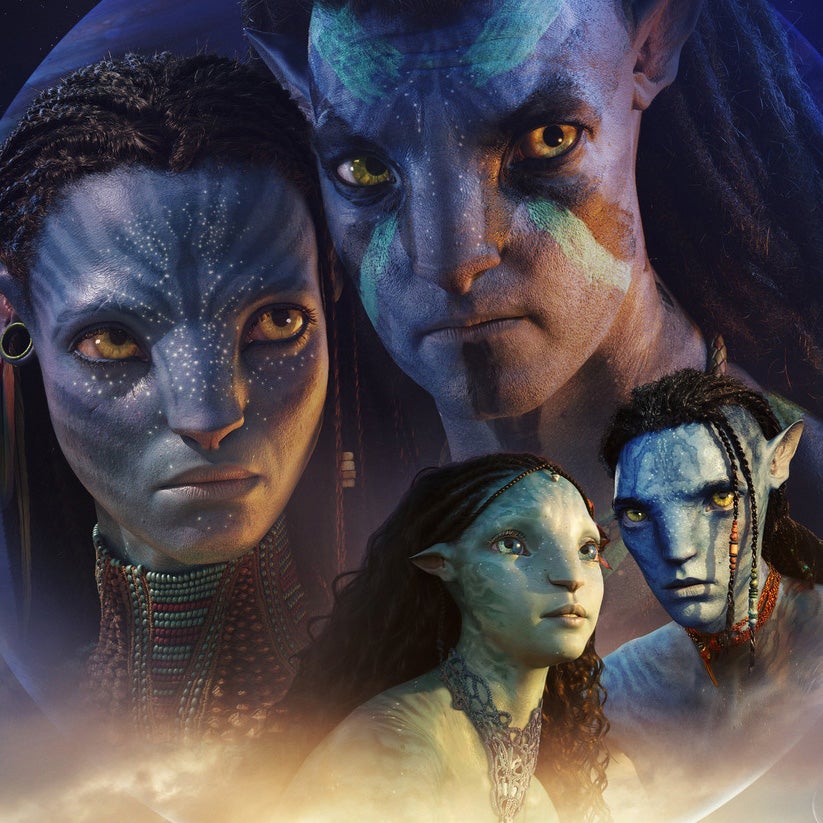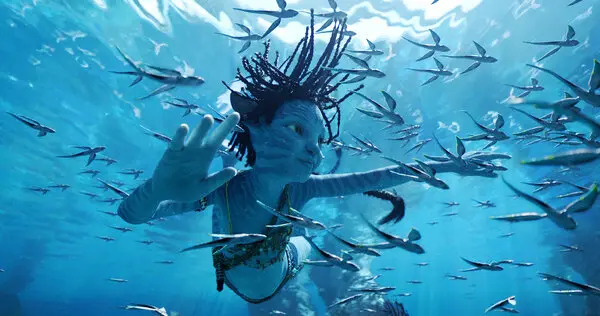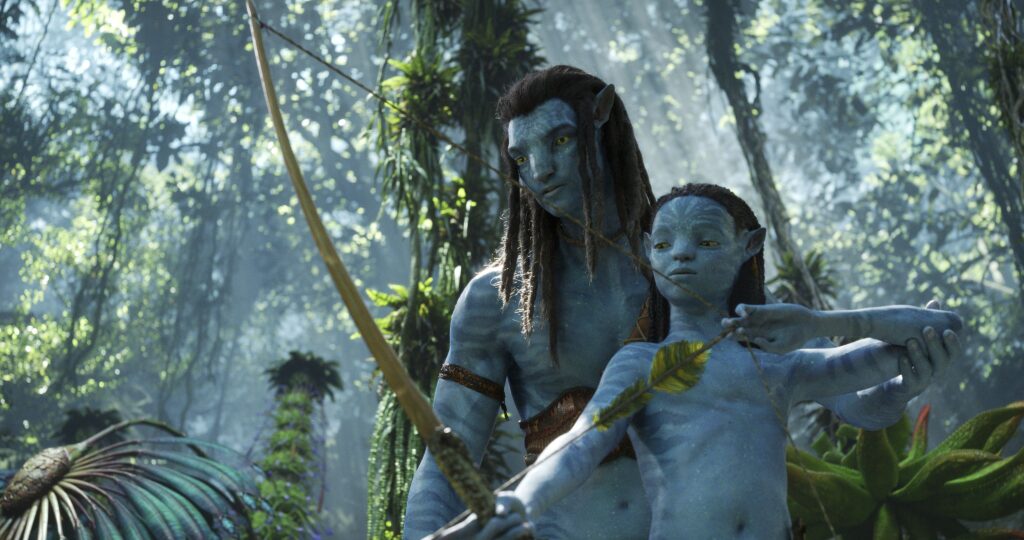Avatar: The Way of Water (2022)

DIRECTOR: James Cameron
CAST: Sam Worthington, Zoe Saldana, Stephen Lang, Sigourney Weaver, Cliff Curtis, Kate Winslet, Edie Falco, Joel David Moore, Dileep Rao, CCH Pounder, Brendan Cowell, Jemaine Clement, James Flatters, Britain Dalton, Trinity Jo-Li Bliss, Jack Champion, Bailey Bass
REVIEW:
James Cameron’s 2009 sci-fi epic Avatar surpassed his own Titanic to seize the “king of the world” title of highest-grossing film of all time, but at the time and possibly even more so in the decade plus since has become—-in spite of, or because of its runaway box office success—-a polarizing film with slavish adherents and others denigrating its narrative as Dances With Wolves In Space with dashes of Pocahontas and Ferngully thrown in for good measure. That it has taken Cameron over a decade to bring a follow up to the screen—-missing the old adage of striking while the iron is hot—-and his lofty stated ambitions to make a total five film series (!), led to some room for doubts even for those wary of betting against Cameron (who has never had a flop on his filmography). Unfortunately, the long-awaited Avatar: The Way of Water is an overlong, overly self-indulgent, narratively unwieldy sequel that despite some admirable qualities and strong moments is too often a slog to get through its bloated runtime.
After a quick recap of what’s come before, narrated by Jake Sully (Sam Worthington) who as you might recall has entirely forsaken his crippled human body and become one of the Na’vi, we pick up fifteen to twenty years later. Jake and his love Neytiri (Zoe Saldana) are now parents to a brood of children including loyal eldest son Neteyam (James Flatters), rebellious Lo’ak (Britain Dalton), adopted daughter Kiri (Sigourney Weaver) mysteriously born from the inert avatar of the late Dr. Grace Augustine (played by Weaver in the first place) and with an equally mysterious connection to Pandora and its deity Eywa, and their youngest child Tuktirey (Trinity Jo-Li Bliss), along with a hanger-on and family friend, a human boy called Spider (Jack Champion) who runs around in the jungle like a dreadlocked Mowgli and comes complete with a reveal about his parentage. But the peace doesn’t last forever, as the “Sky People”—-humans—-aren’t done with Pandora yet. This time, they’re led by the hard-ass General Ardmore (Edie Falco), who’s got more forces at her disposal and an expanded mission. With Earth dying, the humans haven’t just come this time to strip-mine Pandora, but to colonize it, and pacifying the uppity locals is priority number one. And Ardmore has a secret weapon up her sleeve, a strike team of avatars implanted with the memories of military casualties from the first movie, led by their deceased commanding officer Colonel Miles Quaritch (Stephen Lang), who’s got a personal vendetta against Jake and his family. Soon, Quaritch’s attack drives the Sully clan to flee their forest home and throw themselves on the mercy of an island clan (led by Cliff Curtis and Kate Winslet) where they must adjust to their islander ways and learn to adapt to hunting underwater.

First things first: as expected, The Way of Water is visually impressive. Every penny of the budget is up on the screen, from plesiosaur-like mounts to sentient whales who communicate telepathically (via subtitles), to human soldiers operating crab-like underwater craft, to a huge whaling vessel where we get a sci-fi version of a whaling hunt (one of various scenes where Cameron’s eco messaging is laid on in sledgehammer fashion). Would that Cameron had spent as much effort on the script…the first movie might not have boasted a story likely to blow anyone’s mind with its originality, but it had a forward narrative drive and an arc. Watching The Way of Water, one is unable to shake the nagging feeling that there’s not that much of a story here, and definitely not one that required being drawn out across just north of three hours. The Way of Water does an awful lot of what feels like aimless meandering and the chunky and sluggish midsection is too often a laborious chore to get through, so much so that we start to wish to get back to the mustache-twirling Quaritch just for variety (he does generically villainous things like threatening loved ones, burning down villages, and eventually holding children hostage). Couple that with lengthy underwater scenes that feel like we’ve wandered into a sci-fi National Geographic special, and one senses Cameron has fallen a little too far in love with his own visuals and the admittedly splendorous world he’s created. A significant subplot involving Lo’ak’s befriending an outcast sentient whale-like creature, while eventually being relevant to the climax, is both laborious and trite. Eventually, we regain the flagged momentum with an ocean battle pitting the Sullys and the island tribe against whalers and the soldier avatars, and Cameron reaches back into his own filmography to recall Titanic and The Abyss in people trapped in a sinking ship, but even this doesn’t escape feeling a little underwhelming. Avatar built up to an epic battle royale. The Way of Water, after keeping us waiting an unnecessary three hours, comes down to a one-on-one mano a mano aboard a sinking ship. After all is said and done (for now; the movie obviously leaves plot threads dangling for the sequels), there’s a feeling of “is that all?”.

Sam Worthington and Zoe Saldana return, although their roles have been somewhat reduced and there’s an obvious “passing of the torch” to the next generation with the adults often playing second fiddle to their brood of children, although there’s a few too many CGI blue people with similar appearances to keep straight this time. A loss in the family leaves us with a poignant tear-jerking denouement, but this might have been more affecting if the character in question had been more developed. Cameron also seems unwilling to let anyone go, even people who died in the last movie, with the decidedly not teenage Sigourney Weaver playing the Sullys’ teenage daughter (and reprising Dr. Augustine in video logs and a dream sequence) and Stephen Lang going bigger and bluer this time. If Avatar didn’t earn awards for originality, the questionably necessary return of the same villain even after he died in the first movie raises concerning questions about Cameron’s imagination running a little dry. His ambiguous dynamic with SPOILER WARNING his son Spider is meant to give the resurrected (sort of) Quaritch a little more layering than he had before, but it’s not entirely effectual, and he spends most of his screentime being a generically nasty dude who does generically nasty things (in fact, one could argue Quaritch was better-motivated in the first movie). Sam Worthington’s Jake going perma-blue at the end of the first movie and its other two main human roles Stephen Lang and Sigourney Weaver likewise being CGI’ed for their encore leaves human faces fewer and farther between here apart from Jack Champion’s Mowgli-esque Spider. Joel David Moore and Dileep Rao return as Na’vi-sympathizing scientists, but their roles are reduced, and Giovanni Ribisi makes a fleeting cameo. There are a few newcomers—-Edie Falco’s General Ardmore, Brendan Cowell as the whaling captain, and Jemaine Clement as a marine biologist—-but they don’t get a lot of screentime. In the “Na’vi characters not named Sully” contingent, CCH Pounder has a walk-on appearance as Neytiri’s mother, and Cliff Curtis and Kate Winslet don’t get to make much of an impression as the island chieftain and his unwelcoming wife.
While not devoid of interesting elements, it’s hard not to feel disappointed in Avatar: The Way of Water, both for being a sequel that took over a decade to come to fruition only to underwhelm, and for exposing Cameron’s growing self-indulgence and lack of the tight pacing and narrative flow that distinguishes his best films (just compare the fatty, meandering middle act here with the relentless drive of his Terminator films or Aliens). It remains to be seen what Avatar 3 will entail (reportedly around 95% of it is already filmed), but for those dubious of Cameron’s determination to seemingly spend the rest of his film career in the world of Pandora, The Way of Water has only increased those concerns, not allayed them.
* * 1/2